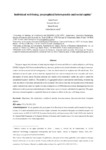Mostrar o rexistro simple do ítem
Individual Well-Being, Geographical Heterogeneity and Social Capital
| dc.contributor.author | Neira Gómez, Isabel | |
| dc.contributor.author | Bruna, Fernando | |
| dc.contributor.author | Portela, Marta | |
| dc.contributor.author | García-Aracil, Adela | |
| dc.date.accessioned | 2024-03-12T16:46:45Z | |
| dc.date.available | 2024-03-12T16:46:45Z | |
| dc.date.issued | 2018 | |
| dc.identifier.citation | Neira, I., Bruna, F., Portela, M. et al. Individual Well-Being, Geographical Heterogeneity and Social Capital. J Happiness Stud 19, 1067–1090 (2018). https://doi.org/10.1007/s10902-016-9840-z | es_ES |
| dc.identifier.issn | 1573-7780 | |
| dc.identifier.issn | 1389-4978 | |
| dc.identifier.uri | http://hdl.handle.net/2183/35860 | |
| dc.description | This version of the article has been accepted for publication, after peer review (when applicable) and is subject to Springer Nature’s AM terms of use, but is not the Version of Record and does not reflect post-acceptance improvements, or any corrections. The Version of Record is available online at: https://doi.org/10.1007/s10902-016-9840-z | es_ES |
| dc.description.abstract | [Abstract] This paper argues the relevance of analysing the origins of contextual effects to explain subjective well-being (SWB). Using the 2012 European Social Survey, the study applies social capital indicators to distinguish between-context and between-individual heterogeneity in three multilevel models of happiness and life satisfaction. Five indicators of social capital at individual and regional level are used to measure the trust, networks and norms dimensions of social capital. Random intercept and random slope hierarchical models are used to control for unexplained regional variability. The possibility of aggregated subjective perceptions conditioning, or interacting with, the effects of individual perceptions is also examined. The results show that the regional means of the social capital indicators are useful to explain not only average levels of SWB (between-context heterogeneity) but also differences in the importance individuals give to their social capital (between-individual heterogeneity). The paper proposes a research agenda to expand the frontier on contextual effects in the new well-being science. | es_ES |
| dc.description.sponsorship | We are grateful to the participants of the Workshop of Socioeconomics and Economic Sociology (A Coruña, 2016) and to anonymous referees for their helpful comments. The research for this paper was conducted as part of the research project ref. EDU-2013-45177-R ‘Education, Employability and Empowerment of the Youth’ (3E4Youth), funded by the National R&D Programme of the Spanish Ministry of Economy and Competitiveness. The views expressed in this paper are not necessarily the views of that organization | es_ES |
| dc.language.iso | eng | es_ES |
| dc.publisher | Springer | es_ES |
| dc.relation | info:eu-repo/grantAgreement/MINECO/Plan Estatal de Investigación Científica y Técnica y de Innovación 2013-2016/EDU-2013-45177-R/ES/EDUCACION, EMPLEABILIDAD Y EMPODERAMIENTO DE LOS JOVENES | es_ES |
| dc.relation.isversionof | https://doi.org/10.1007/s10902-016-9840-z | |
| dc.relation.uri | https://doi.org/10.1007/s10902-016-9840-z | es_ES |
| dc.subject | Happiness | es_ES |
| dc.subject | Life satisfaction | es_ES |
| dc.subject | Multilevel models | es_ES |
| dc.subject | Between-context | es_ES |
| dc.subject | Between-individual | es_ES |
| dc.subject | European regions | es_ES |
| dc.title | Individual Well-Being, Geographical Heterogeneity and Social Capital | es_ES |
| dc.type | info:eu-repo/semantics/article | es_ES |
| dc.rights.access | info:eu-repo/semantics/openAccess | es_ES |
| UDC.journalTitle | Journal of Happiness Studies | es_ES |
| UDC.volume | 19 | es_ES |
| UDC.startPage | 1067 | es_ES |
| UDC.endPage | 1090 | es_ES |
| dc.identifier.doi | https://doi.org/10.1007/s10902-016-9840-z |
Ficheiros no ítem
Este ítem aparece na(s) seguinte(s) colección(s)
-
GI-C+D - Artigos [124]






